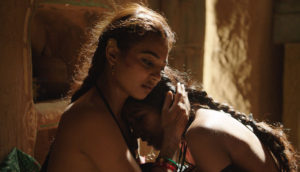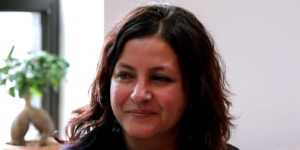Parched would bring a message of humanity – director Leena Yadav
By Neeru Saluja
It’s a story of three ordinary women from a dry remote village. A widowed mother, a vivacious but abused wife and an exotic dancer. Though they live separate lives, their friendship and struggle against the oppressive traditions of the village brings them together. As they break free, director Leena Yadav sparks a dialogue on our society’s issues.

“Parched” which stars Radhika Apte, Tannishtha Chatterjee and Survleen Chawla in lead roles, will open the Indian Film Festival in Melbourne on August 11. Produced by Bollywood actor Ajay Devgun, Parched has already received international acclaim and has had it’s US theatrical release.
Director Leena Yadav who will be attending the festival shared her thoughts on the film in an exclusive interview with the Indian Down Under:
Congratulations on Parched being selected for the opening film for the Indian Film Festival of Melbourne. As the theme of the festival is women empowerment, what message would Parched bring?
Parched would bring a message of Humanity! The message being that stop holding on to rituals and customs that discriminate the woman/girl. Question the validity of norms that we pass off as tradition. Discussion and dialogue are the key. The men in these cultures are equally the victims!
From Shabd to Parched, how would you describe your journey with Indian cinema?
Full of adventure and exploration. All my films so far have been departures from each other. I have been fortunate to get the opportunity to explore such a wide spectrum of story telling. Each film taught me a lot and most importantly I got to work with some of the most amazing talent from across the world with ”˜Shabd’, ”˜ Teen Patti’ and ”˜Parched’ ”“ and I am grateful for that!
We have heard you conducted extensive research for your characters in Parched. How did you go about this? Are the women in Parched based on real life characters?
My research comprised mainly of conversations with women in the villages in Gujarat. But the subject matter was so universal that these conversations continued in the cities and with film makers and friends from across the world. The inspiration for most of my characters came from real life people but in my writing I took it beyond that.
Parched explores friendships, oppression, sexuality, relationships all amongst an Indian remote village. Why did you choose a rural setting for your film?
It was the irony that stories and conditions that took place in a remote village where there is a lack of education and information, had a resonance across the world! That itself is a statement, albeit a very sad one! In the name of progress, we have sometimes just learnt to ”˜cover up’ better!
How did you go about choosing the different actresses for your four female characters?
Tannishtha Chaterjee was part of the project from the discussion stage”¦ In fact, she led me into this world. Then Radhika Apte was the first actress I met for Lajjo. After doing a short audition with her, there was no looking back. Then we got casting director Mukesh Chhabra to come on board. He and his team ”“ Vaibhav and Akash helped us cast all the other actors. Casting Bijli turned out to be most challenging! We were very close to shooting and we didn’t have our Bijli. Finally, Vaibhav came to me with Surveen Chawla’s audition and we had a perfect Bijli! I couldn’t have asked for a better cast than the one we had in the film. I salute the girls for breaking social and personal barriers to do these roles and I am thrilled with the performance of each and every cast member.
When do you plan to release the film in India and how do you think the audience will receive it?
We are looking at a Sept or Oct release this year. Going by the reactions we have got worldwide after every screening of the film, I think the Indian audience will also react very strongly to the film. The challenge only is to get them into the theatres!
Most of your films voice the expression of freedom for women. Do you feel Indian women are able to express their freedom as portrayed in your films?
There is a sense of rebellion in most women that I have met or spoken to who face adverse circumstances. The question is about finding an expression for that feeling. And I feel they do express it in small ways (like Janaki in the film cutting off her hair to protest against marriage). It is the small wars that will bring about the big revolution. So it is important to start a dialogue that can reach women in the remote corners.
You have worked with many big starlets like Amitabh, Ben Kingsley, Russell Carpenter and Aishwarya. How was the experience and what would you define as their strengths?
I have had the fortune to work with some amazing artists ”“ in front of and behind the camera. Firstly, working with such fine artists helps you push your own artistic limits. It makes you take risks with your own limitations. And it also makes you see things from another artist’s perspective. Each of the collaborations mentioned by you has been so different in the impact that they have had on my art and learning that it is difficult for me to answer for all at once. The one common strength that I could mention perhaps, is that, with such great accomplishment comes a great sense of humility and surrender.
Would you consider your films as from today’s age or a bit ahead of what’s happening in the society?
I am story teller who makes films from my understanding of the human psyche or from my observations of life. Judging my films, I would leave to you. It is very difficult for me to answer this question.
Short URL: https://indiandownunder.com.au/?p=7151

